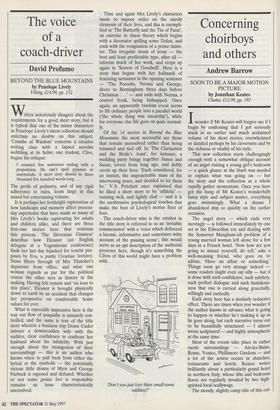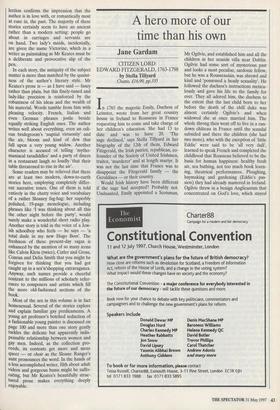Concerning choirboys and others
Andrew Barrow
SOON TO BE A MAJOR MOTION PICTURE by Jonathan Keates Chatto, £12.99, pp. 193 Iwonder if Mr Keates will forgive me if I begin by confessing that I got seriously stuck in an earlier and much acclaimed volume of his short stories, overwhelmed or dazzled perhaps by his cleverness and by the richness or vitality of his style.
This new collection starts challengingly enough with a somewhat oblique account of an angel visiting a young girl's bedroom — a quick glance at the blurb was needed to explain what was going on — but the story and the collection as a whole rapidly gather momentum. Once you have got the hang of Mr Keates's wonderfully fancy style and subject matter, everything goes swimmingly. What a shame I abandoned ship so quickly on the earlier occasion.
The angel story — which ends very movingly — is followed immediately by one set in the Edwardian era and dealing with the Somerset Maugham-ish problem of a young married woman left alone for a few days in a French hotel. 'Now how are you going to amuse yourself, do tell,' asks a well-meaning friend, who goes on to advise, 'Have an affair or something.' Things soon go very strange indeed some readers might even say silly — but it is done with such confidence, such subtlety, such perfect dialogue and such fastidious- ness that one is carried along gracefully, willingly and excitedly.
Each story here has a similarly seductive effect. There are times when you wonder if the author knows in advance what is going to happen or whether he's making it up as he goes along, but each narrative turns out to be beautifully structured — I almost wrote sculptured — and highly atmospheric at the same time.
Most of the events take place in rather exotic surroundings — Aix-les-Bains, Rome, Venice, Phillimore Gardens — and a lot of the action occurs in churches, restaurants and hotels. Keates writes brilliantly about a particularly grand hotel in northern Italy, whose lifts and bedroom floors are regularly invaded by two high- spirited local scallywags. The moody, slightly camp title of this col- lection confirms the impression that the author is in love with, or romantically most at ease in, the past. The majority of these stories certainly seem to have an ancient rather than a modem setting: people go about in carriages and servants are on hand. Two lady's maids, incidentally, are given the name Victorine, which in a writer as painstaking as Mr Keates must be a deliberate and provocative slip of the pen.
In each story, the antiquity of the subject matter is more than matched by the quaint- ness of the author's literary style. Mr Keates's prose is — as I have said — fancy rather than plain, but this finely-tuned and lady-like precision is reinforced by the robustness of his ideas and the wealth of his material. Words tumble from him with pleasing velocity. French, Italian and even German phrases jostle beside equally striking English ones. The author writes well about everything, even an odi- ous bridegroom's 'nuptial virtuosity' and the air, bloom and kind of dew that fall upon a very young widow. Another character is accused of telling `mytho- maniacal taradiddles' and a party of diners in a restaurant laugh so loudly 'that their table threatened to rise in the air'.
Some readers may be relieved that there are at least two modern, down-to-earth stories here, employing completely differ- ent narrative tones. One of them is told entirely in the chatty voice and vocabulary of a rather Sloaney fag-hag: her superbly polished, 19-page monologue, including phrases like 'I was thinking about all this the other night before the party', would surely make a wonderful short radio play. Another story is told in the voice of a Jew- ish schoolboy who feels — he says — 'a total dude in my new Hugo Boss'. The freshness of these present-day sagas is enhanced by the mention of so many icons like Calvin Klein (twice), Cutler and Gross, Conran and Delia Smith that you might be forgiven for thinking that you had got caught up in a sex'n'shopping extravaganza. Anyway, such names provide a cheerful contrast to the millions of scholarly refer- ences to composers and artists which fill the more old-fashioned sections of the book.
Most of the sex in this volume is in fact homosexual. Several of the stories explore and explain familiar gay predicaments. A Young art professor's botched seduction of a fashionable young painter is discussed on page 100 and more than one story gently tackles the delicate but apparently indis- pensable relationship between women and gay men. Indeed, as the collection pro- ceeds, its contents get more and more queer — or choir as the Sloane Ranger's aunt pronounces the word. In the hands of a less accomplished writer, filth about adult videos and gorgeous bums might be suffo- cating, but Mr Keates's beautifully struc- tured prose makes everything deeply enjoyable.



































































 Previous page
Previous page